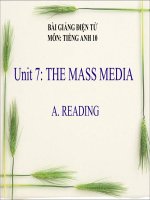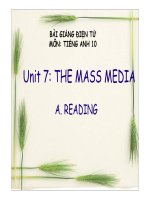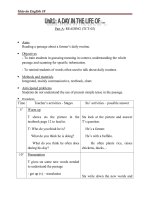Giáo án Tiếng Anh 10 Unit 7: The mass media
Bạn đang xem bản rút gọn của tài liệu. Xem và tải ngay bản đầy đủ của tài liệu tại đây (148.9 KB, 32 trang )
Giáo án Tiếng Anh 10
UNIT 7: THE MASS MEDIA
Theme: The Mass Media
Unit 7: READING
Time: 45 minutes
I. OBJECTIVES:
1. Educational aim: Students should know the advantages and disadvantages of
the mass media and read and understand the information on
T.V
2. Knowledge:
- General knowledge: Students will be able to read and understand about the mess
media nowadays
- Language: Words to read about T.V
- New words:
3. Skill : Reading the mass media
II. METHOD: Intergrated mainly communicative
III. TEACHING AIDS: Some real pictures and information they often see on
T.V, newspaper, internet ect.
IV. PROCEDURE:
1.Organization
2.Check old lesson
3.New lesson
Teacher’s activities
Students’ activities
Warm-up :(5 minutes)
- Ask students to work in groups to - Work in groups
discuss about the kinds of the mass
media that they often see in life
- Let some groups write on the board
- Other groups stand and
speak out
- Lead all kinds to the words: The
mass media
- Read aloud
Pre-reading: (10 minutes)
- Give some questions:
1. Do you like watching T.V?
- Work in groups and
2. What programme do you like the
most?
3.
Do
each group or each pair
stand up: one asks, one
you
like
reading
books, answers
newspaper in your free time?
4. Is it good for you to enrich your
knowledge?
A: Do you like…?
B: Yes, I do. I like
watching the programme
Notes
- Listen and give more ideas to help of
students practise speaking well
sport
and
entertainment most
- Let students work in pairs to answer
some questions in the books
- Listen and remark
- Discuss in pairs and
speak out
A: When do you often
watch T.V?
B:
At
weekend
or
somestimes I’m free.
A: How many…?
While-reading: (20 minutes)
- Let students read some programmes
on T.V and work in groups to answer
some questions
1. How many programmes are there on
VTV1, VTV2, VTV3?
- Work in groups and
then
answer
the
questions
1. There are 17 programs
on VTV1.
- There are 12 programs
on VTV3.
- There are 5 programs
on VTV2.
2. How much time do you often spend 2. I often spend one hour
watching T.V everyday.
watching T.V?
3. I find them interesting
to watch.
3. How do you find some your
favourite programmes?
- Listen and remark each group
- Work in groups
* Task 1:
1. cartoon - C
- Let students to read some words in A: What does “cartoon”
the reading passage and try to guess mean?
the meaning of these words
B: It means a film made
by
photographing
series
of
a
changing
drawing.
2. drama – A
3. comedy – D
4. documentary – B
- Each group asks and
answers in roles and
gives some examples
- Listen to each pair or group and help A: Do you like watching
them correct if needed
comedy?
B: Yes, because it makes
me laugh.
- Reread silently
* Task 2:
- Work in pairs: one asks
and others give their
- Ask students to read the passage and corrections and more
correct the false information
information to prove
- Listen and remark their work
A: There are 5 news
programs on the three
channels. Is it T or F?
B: It’s true. Because
there are 4 on VTV1 and
1 on VTV3.
- Each pair work in role
as the model above
1.T – 2.T – 3.F – 4.T –
5.F
- Read the questions
quickly and try to get
information
from
the
passage
A: How many films are
* Task 3:
on?
- Let students work in pairs to ask and B: Five films are on.
answer questions
A: What time can you
watch the news?
B: At 9 a.m, 12.00, 7a.m,
11 p.m on VTV1 and
7.00 on VTV3.
- Each pair practises
speaking as the model
-
Practise
doing
the
teacher’s askings
Group 1: I like watching
the
- Go around and listen to each pair
news
programme
because it helps me to
get more information in
the world
Post- reading: (8 minutes)
Group 2: …..
- Ask students to work in groups and Group 3: …..
then one of each group stands and
speaks out
- Listen to each group and remark
- Listen and copy down
Homework: (2 minutes)
- Write a short passage to tell what
programmes you like. Why?
-
Do
exercise
Reading
in
the
workbook
V.THE SELF EVALUATION AFTR CLASS
Theme: THE MASS MEDIA
Unit 7: SPEAKING
Time: 45 minutes
I. OBJECTIVES:
1. Educational aim: Students should know the importance of the mass media
2. Knowledge:
- General knowledge: Students will be able to know and understand the types of
media in the world
- Language: Words to speak the mass media
- New words:
3. Skill : Expressing the understandings of media
II. METHOD: Intergrated mainly communicative
III. TEACHING AIDS: Some photos of kinds of media or real information
IV. PROCEDURE:
1.Organization
2.Check old lesson
3.New lesson
Teacher’s activities
Students’ activities
Notes
Warm-up :(5 minutes)
- Ask students to close their books and - Discuss in groups and
think of some types of media by answer the questions
answering some questions
1. Have you got a T.V and radio?
2. Do you often read newspaper?
3. Have you ever
chatted with
someone on the Internet?
1. Yes, I have.
2. Sometimes
3. Yes, I have.
- Say: “T.V, radio, newspaper and the
Internet are called: The mass media”
- Repeat and explain the
phrase words: The mass
media-
is
to
information
get
or
communicate to someone
around in life
Presentation: (30 mintues)
* Task 1:
- Work in pairs and show
- Let students work in pairs and out the types of the mass
remind of the questions that the media
teacher has asked
- They are television,
radio,
Internet.
newspaper,
the
- Practise asking about
the use of each kind
A: What can you get
from watching T.V?
B:
I
can
get
some
- Listen to each pair and help them information about news,
understand more the media
science, education and
entertainment ect.
-
Read
silently
and
discuss in groups
orally: through mouth
* Task 2:
aurally: through ears
- Let students read all the sentences
and know the meaning of the words
visually: through eyes
oral (adj) – orally (adv)
- Read aloud these words
and practise writing the
aural (adj) – aurally (adv)
visual (adj) – visually (adv)
sentences:
+
T.V:
present
information
and
entertainment
visually
and we receive them
through our eyes.
+ Radio
+ Newspaper, Internet
- Each group go to the
board and fill in the
features with each type
of media
- Ask students to work in groups to
write sentences about each type of
media with the cues
- Work in groups and
practise speaking based
- Observe their sentences and compare on some information in
to other groups
task 2
* Task 3:
- Ask students to work in groups and A: What are different
talk about the features of each type of types of the mass media?
the mass media
B: Television, newspaper
and radio…
A: What features do they
have in common?
B: Provide information
- Listen to each group and give more and entertainment
information if they nee
A: What are their own
features?
B:
T.V
presents
information
and
entertainment orally and
visually
- Other groups say about
Radio, newspaper, the
Internet ect.
- Work in groups and
speak out their opinions
+ Group 1: T.V
+ Group 2: Radio
+ Group 3: The Internet
+ Group 4: Newspaper
Practice: (8 minutes)
- Let students work in groups and one
student of each group speak out their
- Listen and write down
opinions about the mass media
- Listen to each group and remark
Homework: (2 minutes)
- Ask students to write something
about the popular media
- Do exercise of speaking in the
workbook
V.THE SELF EVALUATION AFTR CLASS
Theme: THE MASS MEDIA
Unit 7: LISTENING
Time: 45 minutes
I. OBJECTIVES:
1. Educational aim: Students should listen a short news
2. Knowledge:
- General knowledge: Students will be able to listen to news editions through Gapfilling exercise
- Language: Words related to news
- New words:
3. Skill : Listening specific information
II. METHOD: Intergrated mainly communicative
III. TEACHING AIDS: Some photos of kinds of media or real information
IV. PROCEDURE:
1.Organization
2.Check old lesson
3.New lesson
Teacher’s activities
Students’ activities
Notes
Pre-listening:(3 minutes)
- Ask students some questions:
1. What is it?
2. What is it used for?
3. How often do you listen to the
radio?
- Answer the questions
freely
1. It is a radio.
2. It is used for listening.
3. In the morning…
4. How many hours per week do you 4. I am not sure
listen to it?
5. Music/ MTV most
5. What programme do you like wanted program ect.
listening to and why?
- Gather ideas and introduce the
listening
- Say: “News broadcast is a popular
- Listen to the teacher
programme on the radio. Today you
will listen to a short news edition. You
listen to it and do the tasks assigned”
While-listening: (25 mintues)
* Task 1: Ticking the words
- Ask students to read the table in task
1
- Read the table carefully
- Listen to the tape and
- Play the tape the 1st time
do the task individually
- Check if any student gives answers
or not
- Play the tape the 2nd time
- Ask students to do the task
individually first
- Let students compare their answers
- Work in pairs
with a partner
- Check the answers in front of the - Correct the answers
class as a whole
- Give correct answers
* Task 2: Gap-filling
- Let students read two new stories - Work individually
carefully and have the guess of the
missing words
- Play the tape and ask students to fill
in the missing words
- Notice students to catch the exact
words for each blank
- Call on some students to read
completed stories
- Ask for comments from other
- Listen to their friends
students
- Pause the tape when necessary
- Give correct answers:
New story1
1. has caused floods
2. have left their home
3. have risen
4. tow metres
5. has stopped
6. cloudy
7. strong wind
New story 2
1. twenty-third
2. 4, 418
3. California
4. wonderful
5. young and healthy
* Task 3: Answering questions
- Ask students to work in pairs and
answer the questions in the book
- Note: Students are encouraged to do
the task without looking back to the
stories on page 77. However, students
can look back if necessary
- Correct the answers
- Call on some students to read their - Work in pairs and do
answers aloud in front of the class
the task
- Feedback and give correct answers:
- Listen to the teacher’s
1. Heavy rain has caused floods all
instruction
over the country during the night.
2. Because rivers have risen
3. The old woman has climbed Mount
Whitney twenty-three times.
4. Because it has kept her young and
healthy
- Correct the answers
Post-listening: (15 minutes)
- Ask students to work in groups and
use their own words to tell other
members about one of the two news
stories
- Call on some students to present the
story in front of the class
- Ask for comments from other
students
- Work in groups
- Make necessary corrections
Homework: (2 minutes)
- Ask students to do the exercise in the - Some students present
workbook
their stories
- The whole class listen
to their friends and find
out mistakes if they have
- Listen to the teacher
and write down
V.THE SELF EVALUATION AFTR CLASS
Theme: THE MASS MEDIA
Unit 7: WRITING
Time: 45 minutes
I. OBJECTIVES:
1. Educational aim: Students should know the advantages and disadvantages of
the mass media in general and television in especially
2. Knowledge:
- General knowledge: Students will be able to write a paragraph about advantanges
and disadvantages of television and other types of mass
media
- Language: Words related to advantages and disadvantages
- New words:
3. Skill : Writing a paragraph about advantages and disadvantages well
II. METHOD: Intergrated mainly communicative
III. TEACHING AIDS: Textbook, the black board…
IV. PROCEDURE:
1.Organization
2.Check old lesson
3.New lesson
Teacher’s activities
Students’ activities
Pre-listening:(5 minutes)
- Ask students some questions:
1. How often do you watch T.V?
- Answer the questions
freely
2. Is it good or bad?
- “Ok, look at the book. Today we will
discuss the good and bad points of T.V
and the mass media”
- Implicit the meaning of advantage
and disadvantage by analysing the
examples:
1. T.V helps us to learn more about the
world.
2. T.V costs us much time.
Which sentence says good about T.V?
Which one is bad?
- Say: “Well, sentence 1 says good
about T.V and sentence 2 exrpessses
bad point about T.V. They are called
advantage and disadvantage”
- Listen to the teacher
and take notes quickly
Notes
While-listening: (20 mintues)
* Task 1:
- Ask students to read about the
advantages and disadvantages of T.V
- Have students underline the key
words of each idea
- Go around the class and provide help
- Read the task carefully
when necessary
- Make sure students understand all the
advantages
and
disadvantages
mentioned in the book
- Ask the teacher if
* Task 2:
needed
- Ask students to work in pairs and
discuss
the
advantages
and
disadvantages of the mass media and
write them down in the column
- Let students choose of the three types
of mass media to discuss
- Work in pairs and
- Encourage students to find the ideas practise the task
related to the topics
- Ask students to share the ideas with
other pairs
- Give suggested answers
Post-writing: (18 minutes)
* Task 3:
- Ask students to write a paragraph
about
the
advantages
and
disadvantages of one of the mass
media discussed in task 2
- Let students work independently and
write under time pressure
- Introduce peer correction if time
allowed
- Work individually
- Pick up some writings to correct in
front of the class as a whole
Homework: (2 minutes)
- Ask students to choose one of the
following
topics
to
write
advantages and disadvantages
about
1. Listening to music
2. Reading newspapers
- Listen to the teacher
and correct mistakes if
necessary
3. Using the Internet
4. Watching T.V
- Write down
5. Using computer
V.THE SELF EVALUATION AFTR CLASS
Theme: THE MASS MEDIA
Unit 7: LANGUAGE FOCUS
Time: 45 minutes
I. OBJECTIVES:
1. Educational aim: Students should know the advantages and disadvantages of
the mass media in general and television in especially
2. Knowledge:
- General knowledge: Students will be able to write a paragraph about advantanges
and disadvantages of television and other types of mass
media
- Language: Words related to advantages and disadvantages
- New words:
3. Skill : Writing a paragraph about advantages and disadvantages well
II. METHOD: Intergrated mainly communicative
III. TEACHING AIDS: Textbook, the black board…
IV. PROCEDURE:
1.Organization
2.Check old lesson
3.New lesson









